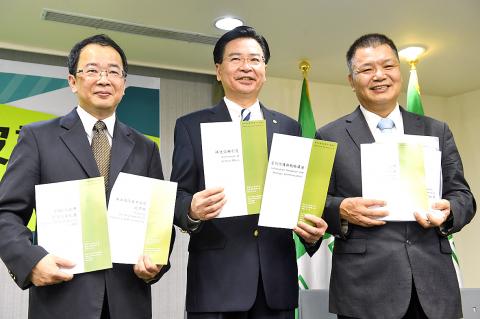The Democratic Progressive Party (DPP) released its defense policy paper yesterday, proposing to establish a cyberarmy as the fourth branch of the armed forces, along with focused investment and government support to develop the nation’s defense industry.
Other key recommendations in the 2015 Defense Policy Blue Paper include nurturing companies for the government’s indigenous submarine plan, merging the Veterans Affairs Council with the Ministry of National Defense and reassessing the all-volunteer military program.
DPP Secretary-General Joseph Wu (吳釗燮) said the nation needs to set up a cyberarmy to combat the daily “digital warfare” seen in cyberattacks from China.

Photo: George Tsorng, Taipei Times
The DPP’s Defense Policy Advisory Committee proposed establishing a cyberarmy by recruiting cybersecurity experts and young computer professionals, with an initial budget of NT$1 billion (US$32.56 million) and a “Cyberarmy Command Headquarters Office” that would integrate the functions and resources from the defense ministry’s “communications electronics and information,” “military intelligence and surveillance,” “digital warfare command” and “communications development” offices.
The party said the new branch would have commissioned officers and a command structure similar to the army’s, with active service obligations and benefits in line with the current branches.
Asked about the DPP’s proposal, defense ministry officials said the National Security Act (國家安全法) could be amended to enable existing units of the armed forces to defend the nation’s digital territory.
They also said that the military has in recent years adjusted its resources and recruiting to attract computing and electronic communications staff to enhance the nation’s overall cybersecurity, while the military employs cyberattack simulations during its digital warfare exercises.
Committee convener York Chen (陳文政) said the nation has the talent in science and engineering to obtain the technical know-how to advance toward the goal of a self-sufficient defense industry.
“An indigenous defense industry has a positive strategic impact on bolstering public confidence in, and support of, national defense,” the policy paper says.
DPP officials said Taiwan faces increasing difficulty in obtaining foreign arms because of China.
The policy paper says the government should seek international cooperation with its allies on new technologies so that it could eventually produce and maintain most of its weaponry and equipment.
It also says the defense ministry should encourage investment in the capacity for indigenous arms production.
“In the past, Taiwan’s defense ministry officials often headed to the US with shopping lists of weapons and military equipment to buy,” Wu said.
“That was the old approach. In the future, we will go to the US and tell them what our needs are and what are our weaknesses are. We will ask them to assist and upgrade our domestic defense sector in these areas,” he said.
The annual budget of the defense ministry should be stabilized at 3 percent of Taiwan’s GDP, Wu said.

AIR SUPPORT: The Ministry of National Defense thanked the US for the delivery, adding that it was an indicator of the White House’s commitment to the Taiwan Relations Act Deputy Minister of National Defense Po Horng-huei (柏鴻輝) and Representative to the US Alexander Yui on Friday attended a delivery ceremony for the first of Taiwan’s long-awaited 66 F-16C/D Block 70 jets at a Lockheed Martin Corp factory in Greenville, South Carolina. “We are so proud to be the global home of the F-16 and to support Taiwan’s air defense capabilities,” US Representative William Timmons wrote on X, alongside a photograph of Taiwanese and US officials at the event. The F-16C/D Block 70 jets Taiwan ordered have the same capabilities as aircraft that had been upgraded to F-16Vs. The batch of Lockheed Martin

US President Donald Trump yesterday announced sweeping "reciprocal tariffs" on US trading partners, including a 32 percent tax on goods from Taiwan that is set to take effect on Wednesday. At a Rose Garden event, Trump declared a 10 percent baseline tax on imports from all countries, with the White House saying it would take effect on Saturday. Countries with larger trade surpluses with the US would face higher duties beginning on Wednesday, including Taiwan (32 percent), China (34 percent), Japan (24 percent), South Korea (25 percent), Vietnam (46 percent) and Thailand (36 percent). Canada and Mexico, the two largest US trading

GRIDLOCK: The National Fire Agency’s Special Search and Rescue team is on standby to travel to the countries to help out with the rescue effort A powerful earthquake rocked Myanmar and neighboring Thailand yesterday, killing at least three people in Bangkok and burying dozens when a high-rise building under construction collapsed. Footage shared on social media from Myanmar’s second-largest city showed widespread destruction, raising fears that many were trapped under the rubble or killed. The magnitude 7.7 earthquake, with an epicenter near Mandalay in Myanmar, struck at midday and was followed by a strong magnitude 6.4 aftershock. The extent of death, injury and destruction — especially in Myanmar, which is embroiled in a civil war and where information is tightly controlled at the best of times —

China's military today said it began joint army, navy and rocket force exercises around Taiwan to "serve as a stern warning and powerful deterrent against Taiwanese independence," calling President William Lai (賴清德) a "parasite." The exercises come after Lai called Beijing a "foreign hostile force" last month. More than 10 Chinese military ships approached close to Taiwan's 24 nautical mile (44.4km) contiguous zone this morning and Taiwan sent its own warships to respond, two senior Taiwanese officials said. Taiwan has not yet detected any live fire by the Chinese military so far, one of the officials said. The drills took place after US Secretary